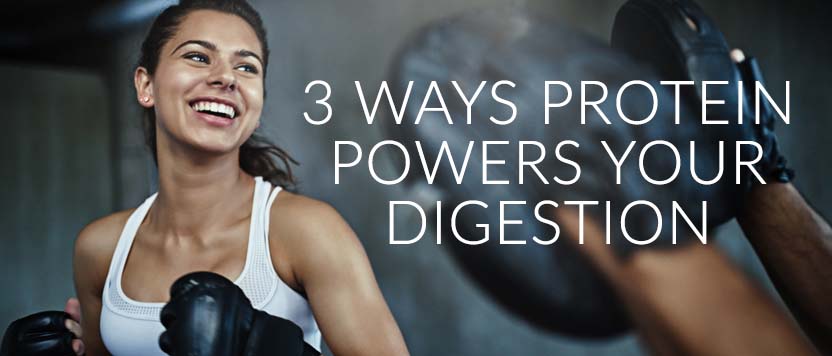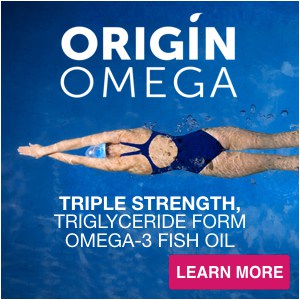Digestive support can be really complicated, often involving words such as- Probiotics. Digestive Enzymes. Gluten sensitivity. Lactose intolerance. Crohn’s disease. Irritable Bowel. Activated Charcoal. Aloe. Ginger. Hydrochloric Acid. Colonoscopy. Fiber. Prebiotics. Butyrate. Digestive Bitters. Turmeric. We do our best to break down these sometimes hard to digest topics into bite-sized pieces (check out our many digestion-positive posts), but today we aren’t here today to discuss the building blocks of bile or nutritional support for low stomach acid- today we are here to talk something not often associated with healthy digestion, today we are talking about protein.
When it comes to digestion protein comes first. You must be able to build your gut and digestive juices, repair your gut, and modulate digestion- all of which requires adequate, regular, high quality protein intake. There’s a reason “protein” derives from the Greek word protos, meaning “first.” Without attending to your protein intake, you may be sacrificing your nutritional health in several ways- and digestion is no exception! Read on to learn three essential digestive roles of protein as well as easy nutrition tips to regular-ize your intake!
- Protein Supports Gut Repair.
Your digestive tract is just that- a long, giant tubular passage made of many layers of modified skin cells. These skin tissue layers, like the layers on your outer skin, or inside your nose, are constantly damaged, constantly turning over, and constantly reproducing. But what we may not think about often enough is that the main component of these tissues is protein.
Most of your gastrointestinal tract secretes mucus to protect itself, a substance also made of protein. Without adequate protein, fats, and micronutrients, your digestive tract may not adequately do its job of absorbing nutrients. Normal digestive wear and tear requires frequent infrastructure repair, just like our highways. Add a layer of inflammation, irritable bowel challenges, or other gastrointestinal insults, and you may need additional protein[1] or other nutrients to help your body heal itself.
In addition to certain fats, vitamins, and minerals, you need many specific protein parts called amino acids and polyamines (amino acid derivatives), to heal and rejuvenate your gut lining.[2] One particular amino acid that is very good at rejuvenating your gut lining is called L-glutamine. L-glutamine is found in both animal than plant proteins (although animal proteins such as whey contain greater quantities than plant proteins), and and is known to encourage your gut cells to proliferate![3]
- Protein Promotes Stomach Acid
Chewing, smelling, seeing, and tasting food in general- but particularly protein- sends a signal to your stomach to produce more hydrochloric acid. This acid, in turn, helps you digest protein, because it denatures (unfolds) long protein strands- the first step in protein digestion- think about unravelling balled-up yarn before you cut it into small strands. Acid activates proteases in your stomach, enzymes that cut the protein strands into smaller pieces. What this means is that as you eat more protein more mindfully, you should be able to more easily digest protein. Many people produce poor levels of stomach acid, including some who do not consume animal foods regularly, who suffer from hypothyroidism, or who take certain medications. Robust stomach acid does more than just support protein digestion- read up on the benefits of boosting stomach acid in our post here. This is critical. With inadequate acid, properly digesting protein can be nearly impossible.
- Protein Powers Up Pancreatic Enzymes
Once your stomach has churned your food with acid and the stomach’s digestive enzymes for protein and fat, the mixture travels to your small intestine for further digestion and for nutrient absorption. Part of your pancreas makes hormones that regulate blood sugar, but the other part of your pancreas is devoted to making pancreatic digestive enzymes that squirt into your small intestine and mix with your food. These enzymes digest, or cut up, carbohydrate, fat, and protein into the smallest possible pieces. You then absorb those pieces in your small intestine. If you do not make adequate digestive enzymes, you cannot absorb adequate nutrition from your food. You may also experience unpleasant bowel symptoms with incomplete digestion.
Sounds simple right? And it is, if your body has everything it needs. But did you know that every enzyme in your body is made out of protein, and pancreatic enzymes are no exception? When you run low on protein, there are certain tissues that require the protein you do have (heart, brain, diaphragm) more so than others (happy neurotransmitters, digestive repair). Your body is smart and makes the right choices for immediate survival, but over time, these choices have consequences. Moreover and more simply, if you undereat protein for a long period of time, you will make less enzymes to digest that protein simply because your body doesn’t see a need to keep making them.[4] This may hinder protein digestion, should you choose to increase it, for a notable adjustment period.
Power up with Protein!
The bottom line is- to support digestion and other critical functions, power up with protein. Let’s look at some adjustments to your food, lifestyle, and supplements that may be useful as you peruse your potential protein choices!
- STEP ONE – FOOD. Eat the right amount of protein, ideally from diverse sources, to support your bodies need for protein.
- Be on target with protein. Unless you have a medical or sports goal requiring a very specific protein intake, choose 1-2 oz of protein per snack and 3-4 oz of protein per meal. Aim on the higher end for men and the shorter end for women, and adjust your number of meals and snacks according to your activity level and weight management goals. You can get far more specific with this with a professional, an app, or a calculator, but these general guidelines that shouldn’t over- or under- feed the average person.
- Eat protein at every feeding. This advice isn’t just for those trying to maintain muscle or stabilize blood sugar! You will digest and absorb protein more easily in smaller, more regular feedings than in a few large feedings. Don’t worry that protein is considered an acid based food. If you are following an alkalizing diet make sure to read check out our blog on this topic.
- Choose foods rich in the amino acid L-glutamine. Meats, fish, dairy, and even eggs are good sources of glutamine. Cabbage is also a good source.
- Make protein portable. Prepare and pre-package 1-2 oz protein snacks or drinks and have them ready to go if you need to run an errand or exercise away from the opportunity for a real meal. Or blend and bolt- try a triple threat shake for a nutrient powerhouse that delivers on far more than protein!
- STEP TWO – LIFESTYLE. Be mindful of food, medications, and other challenges that make it harder to digest and absorb protein.
- Soothe stress. Stress hinders your digestion because digestion isn’t critical when you are running from a tiger. Running is. The problem with modern living is that our bodies are still adapted for a time when all intense stress was physically threatening. Stress not only reduces your production of stomach acid, but also can affect your probiotics, the wavelike motions through your gut that facilitate digestion, and your likelihood of devoting resources to gut repair. For many of us, soothing stress is an active effort, not a passive one. For more on micronutrients that help us fight stress, check out our post here.
- Mind your medications. Medications that block stomach acid, such as antacids, histamine blockers, and others, can compromise protein digestion. Unless contraindicated for you, try boosting your stomach acid with safe, natural support if you have a history of shutting it down.
- STEP THREE – SUPPLEMENTS. Have a backup protein plan.
- Get your drink to go. This is what we made POWER non-denatured organic protein for- to help you get the nutrition you need with the ease that fits the pace of modern living. Dive into a delicious triple threat shake, or swirl up your smoothie, or turbocharge your favorite tea with our 100% grass-fed whey or clean plant proteins.
- Deal with difficult digestion. You may choose to bring on board a well-rounded, easy to digest multivitamin to support digestive wellness beyond your basic protein needs. As noted above, you may require professional guidance. Many people benefit from improved protein digestion with the help of Betaine HCl for stomach acid support or digestive enzymes to supplement pancreatic production.
Whether you have mild gastrointestinal challenges or inflammatory bowel disease, adequate protein is essential for your gut to not only do its good work, but also to regulate and repair itself. Poor protein levels can cause many problems beyond digestive distress, but what the challenges of protein deficiency have in common is their insidious nature. They develop over time and creep up on you. To avoid this, it is important that you focus on having protein in small, regular amounts at multiple feedings per day to ensure adequacy- and we’re here to support you every step of the way. Protein puts you in power!
[1] https://www.ncbi.nlm.nih.gov/pmc/articles/PMC5372973/
[2] https://www.ncbi.nlm.nih.gov/pmc/articles/PMC5105338/












